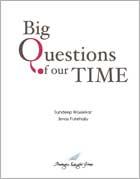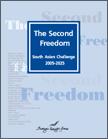Challenges Facing the World in the Next Decade
 |
June 2016
By Dr. Amatzia Baram, Professor Emeritus at the Department of the History of the Middle East and Director of the Centre for Iraq Studies at the University of Haifa, Israel
|
The following article is part of the SFG publication “Big Questions of Our time: The World Speaks”. To access the full publication please click here.
----------------------------------------------------------------------------
The most serious challenge the world is going to face in the next five to ten years is the synergy of two of the most threatening challenges of today: climate change and radical Islam. There are two mutually-reinforcing reasons for the huge wave of migrants flooding Europe from the Middle East and Africa. One is a well-known and much discussed disaster, the hyper-active atrocities of a large number of radical Islamic movements, beginning with ISIS and al-Qaeda affiliates in the Arab world and ending with Boco Haram and similar movements in sub-Saharan Africa.
If we add to it the atrocities performed by the Asad regime in Syria in reaction to the Islamist onslaught, this is a sufficient explanation for mass migration. Most migrate from refugee camps in Turkey with government encouragement, others through Libya, where there is no government at all. The unexpected mass migration that may reach one million people in 2015 annually, almost all of them Muslims, is flooding Europe mainly with young men who know little about European culture and who do not speak the local languages, but who expect to be treated well, even lavishly by the host countries.
The problem is that the latter had no time to prepare for it. The result is showing already: deep frustration on the part of the immigrants and trepidations on the part of large segments of the host countries. This is not to say that all or even a sizable portion of the young men flocking to Europe are crazed Islamist activists: the vast majority is peaceful. At the moment all they want is food, shelter, some other services and jobs. And yet, if Europe cannot fulfill those expectations very quickly, these migrants will become nothing short of a time-bomb. Even if all their immediate expectations are met, if Europe cannot find a way to effectively integrate these human masses within a few years it will be facing disaster.
The other pushing force is the drying of the Middle East, most likely as a result of a long-term climate change. There is a noticeable decline in rainfall and the water level in the Tigris and the Euphrates and their tributaries is getting very low. Due to a combination of government neglect and technological limits, for over a decade millions of farmers have been leaving their land and moving to the large cities, where the state is unable or unwilling to support them. The land itself is gradually turning into dust.
The “desertification” of the Middle East and ways to remedy it is outside my professional expertise, but whatever can be done in this respect depends, first, on political stability, then on technology and massive injection of funds. This means eradicating radical political Islam. The eradication of radical Islam must go hand in hand with a religious reform in Islam. The process that took place in Europe, beginning in the Renaissance through the Enlightenment and ending with modern liberalism and the separation between religion and state has barely begun in the Arab Islamic world, and even that process is patchy, feeble and highly brittle.
Even if Islam is separated from the state, it still needs reform. It can be reformed mostly by Islamic scholars, or clerics, the Ulama. Lay men can help a great deal but they are powerless to provide full legitimacy to such a reform. Arab governments, though, had traditionally great influence on the ulama, and this is still the case today. The first concept that must be reformed in contemporary Islam is that of jihad. Here the Ulama may follow in the footsteps of the Sunni Ahmadi sect that ruled that God authorized only the Prophet Muhammad to launch jihad, and this authorization died with him. By way of comparison: no Jew or Christian today is expected to repeat Joshua’s lethal practice toward the Canaanites. A wider concept that must be reformed is the Shari`ah, that needs to be re-interpreted in a far more liberal fashion. For example, female status must be equated with that of males and the hudud, the punishments meted for a number of offenses must be relegated to history. Islam’s traditional attitude toward those who left Islam and toward other religions and civilizations too must be liberalized. Education in most Arab lands must be changed: more time needs to be dedicated to science, social studies and foreign languages and less to Qur’an and Hadith. Qur’an and Hadith will still be important, but need to be understood in a modern liberal spirit. In Egypt President al-Sisi is already trying to move state education and the religious establishment in that direction, but so far he is the only political leader to do so. In the West at least education in the Islamic schools should be changed with the same aim in mind and mosque imams and khatibs (preachers) must not be allowed to preach for jihad, be it against the West or against other Islamic sects. Religious reforms take time, but the time to start is now.
Related Publications
-
.jpg&maxw=50)
Big Questions of Our time: The World Speaks, 2016
Download:Big Questions of Our time: The World Speaks _Full Report
-

-

Second Freedom South Asian Challenge 2005-2025, 2005
read more
Download:Second Freedom South Asian Challenge 2005-2025 Full Report
Related latest News
Related Conferences Reports
-

Global Challenges Conference, October 2016
Download:Global Challenges Conference Report
-

Conference on Responsibility to the Future: Business, Peace and Sustainability, June, 2008
Download:Global Security and Economy: Emerging Issues


